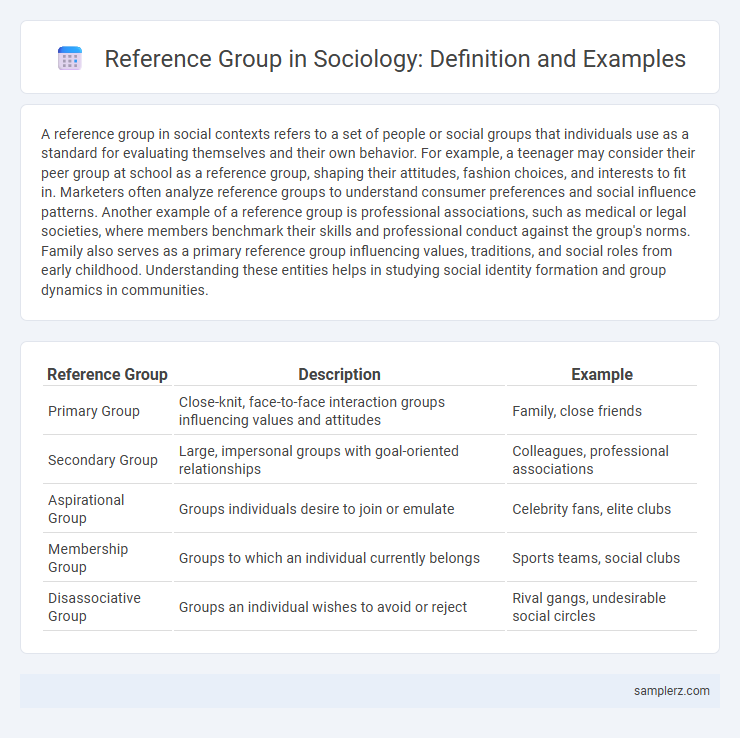A reference group in social contexts refers to a set of people or social groups that individuals use as a standard for evaluating themselves and their own behavior. For example, a teenager may consider their peer group at school as a reference group, shaping their attitudes, fashion choices, and interests to fit in. Marketers often analyze reference groups to understand consumer preferences and social influence patterns. Another example of a reference group is professional associations, such as medical or legal societies, where members benchmark their skills and professional conduct against the group's norms. Family also serves as a primary reference group influencing values, traditions, and social roles from early childhood. Understanding these entities helps in studying social identity formation and group dynamics in communities.
Table of Comparison
| Reference Group | Description | Example |
|---|---|---|
| Primary Group | Close-knit, face-to-face interaction groups influencing values and attitudes | Family, close friends |
| Secondary Group | Large, impersonal groups with goal-oriented relationships | Colleagues, professional associations |
| Aspirational Group | Groups individuals desire to join or emulate | Celebrity fans, elite clubs |
| Membership Group | Groups to which an individual currently belongs | Sports teams, social clubs |
| Disassociative Group | Groups an individual wishes to avoid or reject | Rival gangs, undesirable social circles |
Types of Reference Groups in Social Settings
Reference groups in social settings include membership groups, which consist of individuals with direct social interaction, such as family and close friends. Aspirational groups represent people or collectives individuals aspire to join, influencing behavior through idealized standards, like celebrities or professionals in a desired career. Dissociative groups are those individuals seek to distance themselves from, often due to conflicting values or behaviors, such as rival social groups or disliked subcultures.
Peer Groups as Influential Reference Groups
Peer groups serve as powerful reference groups in social contexts by shaping individual behaviors, attitudes, and social norms. These groups provide members with a sense of identity and belonging while influencing decision-making processes through shared values and practices. Research shows that adolescents and young adults are particularly susceptible to peer group influence, impacting their choices in fashion, music, and social activities.
Family as a Primary Reference Group Example
Family serves as a primary reference group, shaping individuals' values, beliefs, and behaviors from early childhood. The shared experiences and emotional bonds within family units provide a foundational social context influencing decision-making and identity formation. Research highlights that family members often act as role models and sources of social norms in various cultural settings.
Reference Groups in Educational Environments
Reference groups in educational environments often include classmates, teachers, and academic advisors who influence students' attitudes, behaviors, and academic performance. Peer groups play a crucial role in shaping study habits, social norms, and career aspirations by providing support and motivation. Faculty and staff act as role models and evaluators, significantly impacting students' educational goals and self-concept.
The Role of Social Media Influencers as Reference Groups
Social media influencers serve as powerful reference groups by shaping consumer behavior through their trusted recommendations and lifestyle portrayals. Their ability to engage niche audiences on platforms like Instagram, TikTok, and YouTube drives trends and brand loyalty effectively. Marken such as Nike and Glossier leverage influencer partnerships to boost credibility and influence purchasing decisions across diverse demographics.
Professional Associations as Reference Groups
Professional associations serve as influential reference groups by shaping individuals' career choices, work ethics, and professional identities through shared norms and standards. Members often adopt behaviors, values, and skills endorsed by these organizations to enhance their social status and network within their industry. Such associations provide critical support, resources, and recognition that guide members' professional development and decision-making processes.
Celebrity Endorsements and Reference Group Impact
Celebrity endorsements serve as powerful reference groups influencing consumer behavior by shaping preferences and brand perceptions. Fans often emulate celebrities' lifestyle choices, leading to increased product credibility and social validation. The impact of these endorsements extends to shaping cultural trends and peer group attitudes within various social segments.
Religious Communities as Reference Groups
Religious communities serve as influential reference groups that shape individuals' values, beliefs, and behaviors through shared rituals and moral guidelines. Members often look to these groups for social support, identity affirmation, and normative standards that guide ethical decision-making. The collective influence of religious communities strongly impacts lifestyle choices, social interactions, and community engagement.
Sports Teams as Reference Group Examples
Sports teams serve as influential reference groups by shaping fan behaviors, values, and social identities through shared loyalty and community engagement. Membership in a sports team's fan base often drives consumption patterns of merchandise, media, and event attendance, reinforcing group norms and collective pride. Examples include global phenomena like FC Barcelona or the New York Yankees, whose passionate followers demonstrate the impact of sports teams as powerful social reference groups.
Reference Groups within Online Communities
Reference groups within online communities often influence members' attitudes and behaviors by providing norms and social validation. Examples include gaming forums where players adopt strategies and language from influential members or social media groups that shape fashion trends and consumer choices through peer recommendations. These digital reference groups create a sense of belonging and guide decision-making in virtual environments.

example of reference group in social Infographic
 samplerz.com
samplerz.com